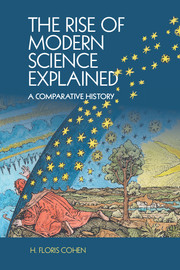Book contents
- Frontmatter
- Contents
- Introduction: the Old World and the New
- 1 To begin at the beginning: nature-knowledge in Greece and China
- 2 Islamic civilisation and medieval and Renaissance Europe
- 3 Three revolutionary transformations
- 4 A crisis surmounted
- 5 Expansion, threefold
- 6 Revolutionary transformation continued
- Epilogue: a look back and a look ahead
- Timeline 1: pre-1600
- Timeline 2: 1600–1700
- A note on the literature
- Provenance of quoted passages
- Index
1 - To begin at the beginning: nature-knowledge in Greece and China
Published online by Cambridge University Press: 05 March 2016
- Frontmatter
- Contents
- Introduction: the Old World and the New
- 1 To begin at the beginning: nature-knowledge in Greece and China
- 2 Islamic civilisation and medieval and Renaissance Europe
- 3 Three revolutionary transformations
- 4 A crisis surmounted
- 5 Expansion, threefold
- 6 Revolutionary transformation continued
- Epilogue: a look back and a look ahead
- Timeline 1: pre-1600
- Timeline 2: 1600–1700
- A note on the literature
- Provenance of quoted passages
- Index
Summary
The natural world around us looks both impressive and mysterious. In the past, controlling it in times of drought or plague required magical incantations, while real understanding came via the world of the gods. Take the Iliad or the Odyssey: the angry voice of Zeus (Jupiter) is heard in a thunderstorm; volcanic eruptions and earthquakes are caused by Hephaestus (Vulcan) hammering on his anvil; if rain should fall while the Sun is shining, Iris hurries to place a rainbow in the heavens. In the pantheons of other civilisations it was much the same if with different names. But such explanations still left open the possibility of penetrating more deeply into specific phenomena. The Babylonians, for instance, produced strikingly accurate predictions of the positions of the Moon, stars and planets by systematically tracking their movements through the night sky. The Polynesians, by sophisticated observation of subtle changes in cloud formations and bird flight, were able to navigate their canoes accurately over hundreds of miles of ocean.
Among the civilisations that developed such specialised nature-knowledge, two took a further decisive step. They were the Greeks in the sixth century BC and the Chinese at about the same time. Both ceased appealing to explanations of the Zeus/Iris type, and came up with a very different picture of the natural world. They did not abandon their belief in gods and the spirit world, but they no longer attributed the myriad of natural events to divine action. Instead, they posed certain principles of natural order and established certain explanatory schemata that enabled them to understand and chart the whole of the natural world from a few fundamental points of view.
There are of course many ways of doing this, and just as one can choose between eating with a knife and fork or with chopsticks, or writing with letters or characters, so one can choose between different ways of approaching natural phenomena and breaking them down into manageable portions. Accordingly, how the Greeks chose to approach and order the natural world turned out to be very different from how the Chinese did essentially the same thing. The Chinese approach relied primarily on observation and focused on practical use. In the second century, Zhang Heng attempted to detect regularity in the occurrence of earthquakes in order to find a way of predicting them.
- Type
- Chapter
- Information
- The Rise of Modern Science ExplainedA Comparative History, pp. 7 - 50Publisher: Cambridge University PressPrint publication year: 2015



